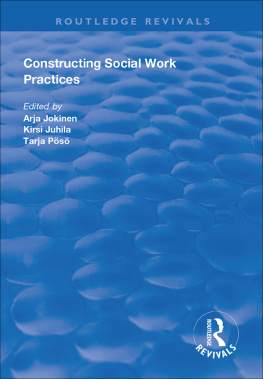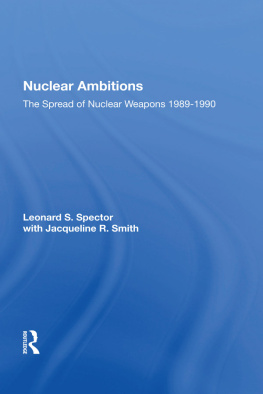CONSTRUCTING SOCIAL PROBLEMS
Constructing Social Problems
MALCOLM SPECTOR AND JOHN I. KiTSUSE
WiTH A NEW INTRODUCTION by JOHN I. KITSUSE
First published 1987 by Transaction Publishers
Published 2017 by Routledge
2 Park Square, Milton Park, Abingdon, Oxon OX14 4RN
711 Third Avenue, New York, NY 10017, USA
Routledge is an imprint of the Taylor & Francis Group, an informa business
New material this edition copyright 2001 by Taylor & Francis.
Copyright 1987 by Taylor & Francis.
All rights reserved. No part of this book may be reprinted or reproduced or utilised in any form or by any electronic, mechanical, or other means, now known or hereafter invented, including photocopying and recording, or in any information storage or retrieval system, without permission in writing from the publishers.
Notice:
Product or corporate names may be trademarks or registered trademarks, and are used only for identification and explanation without intent to infringe.
Library of Congress Catalog Number: 00-055201
Library of Congress Cataloging-in-Publication Data
Spector, Malcolm.
Constructing social problems / Malcolm Spector, John I. Kitsuse.
p. cm.
Includes bibliographical references (p.) and index.
ISBN 0-7658-0716-5 (pbk.: alk. paper)
1. Social problems. I. Kitsuse, John I. II. Title.
HN28 .S7 2000
361.1dc21
00-055201
ISBN 13: 978-0-7658-0716-8 (pbk)
This work began in a graduate seminar at Northwestern University. We gratefully acknowledge the interest and assistance of the participants in that seminar who helped us set this project in motion. Several earlier papers, published in Social Problems and Teaching Sociology, benefitted from the criticisms of Sheldon Messinger, Howard Becker, Allan Schnaiberg, John Walton, Joseph Gusfield, and Kai Erikson. Sally Mae Spector aided greatly in the final editing, untangling many an awkward sentence. We also wish to acknowledge the exceptional editorial intelligence of James F. Short, Jr. His counsel was invaluable and always pressed us to clarify the logic of our statements. As we have not always followed the advice of our colleagues, we relieve them of responsibility for whatever defects of omission and commission that remain. Finally, our thanks to Mrs. Alice Lamming for typing the manuscript.
The study of social problems and the courses listed in the offerings under that title have been organized and dominated by textbooks and those who write them. As a course offered by sociology departments, social problems has usually been assigned to the most junior members of the department, an experience that we encountered early in our own teaching careers. However, we wondered if the course might be given academic respectability by developing a syllabus around issues of theory and methods in the study of social problems. Our interest in this project continued over the years, and in the early 1970s, when preparing to teach a graduate seminar on the sociology of social problems (possibly the first), our review of the "literature" revealed the absence of any coherent statement of theory or method in this field of study. Indeed, "social problems" seemed hardly to be a "field of study" within the discipline. The subject was for many years listed and offered by departments of sociology as a "service course" to present undergraduates with "what they should know" about the various "social pathologies" that exist in their society. That is, social problems seemed only to be a matter in the entrylevel undergraduate curriculum rather than a topic for serious sociological study or research. This conception of social problems has for several decades been reflected in the substance and quality of the "literature," which has been dominated by textbooks that offer compilations of facts documenting the existence of the author(s)' arbitrarily selected assortment of what they conceive to be "social ills."
Constructing Social Problems ( CSP ), first published in 1977, was our response to the disarray we found when we began our project on social problems noted above. We began the book with the statement: "There is no adequate definition of social problems within sociology, and there is not and never has been a sociology of social problems." We proposed "to provide such a definition and to prepare the ground for the empirical study of social problems." Accordingly, we recommended that social problems be conceived and defined as an activity by which groups identify "problems" which they claim to be harmful, undesirable, unjust and in need of corrective attention. By this definition, any and every problem claimed to be a problem by whatever group on whatever grounds would qualify as subject matter for the study of social problems. A major consequence of this definition is that a social problem is not seen as an "objective condition" but rather as the process of interaction between claimants that is organized by what they claim to be "a problem." The "objective condition" that in conventional perspectives is seen both to provoke or cause people's claims and to be the center of sociological analysis (for example, What is it? What causes it? Is it getting worse? and so on) then appears only in the claimsmaking and related discourse of the claimants and those who respond to them. This notion or concept of "objective condition" ceases to be a resource for sociological analysis but, instead, becomes a topic for that study to be found in the claimsmaking and responding activities of those involved in "the problem."
This conception of social problems has been criticized from conventional perspectives as asserting that social problems are not about anything, that is, that there need be no "objective condition" to activate the claimsmaking process, leading critics of the constructionist formulation to charge that it allows no basis for assessing the scientific ("independent") validity of claims. Indeed, our view is that it is not the task of the sociologist of social problems to verify and/or assess the validity of what claimants assert to be a problem.
This definition focuses the sociologist's attention on the social interaction process by which claimants press and develop their claims about the problems as they define them. This does not impose "expert" criteria of "significance" or "importance" on the claim that might disqualify it as a subject matter for study.
In the twenty or more intervening years since the first publication of CSP, notable attention and activity have been given to the clarification and elaboration of the various theoretical and methodological confusions we pointed out (see Woolgar and Pawluch 1985; Holstein and Miller 1993). From this discussion and related debates has emerged a perspective in the sociology of social problems that has come to be known as "constructionist." The issues that have come to define this perspective were viewed by many sociologists of social problems as contentious and even some were seen as without basis. Still, some of these questions remain and have not been systematically addressed. Surprising though it may be, one such ambiguity remains in the contemporary literature, theoretical as well as empirical, with respect to a consistent definition of "social problem," one that logically and clearly specifies the subject matter to be studied. While this surely is problematic for our colleagues who want to use this perspective for their research, it is especially confusing for students who are being introduced to constructionist ideas. One important goal in writing CSP was to provide a text that would be accessible to students enrolled in social problems courses that would enable them to conduct social problems research from the constructionist perspective.













